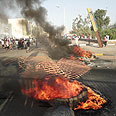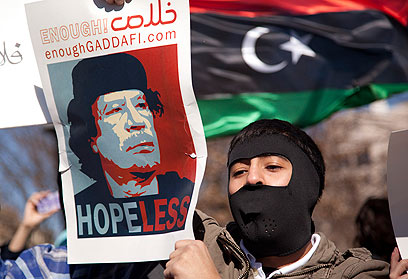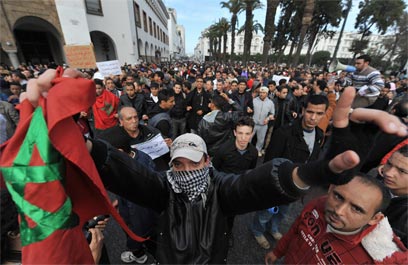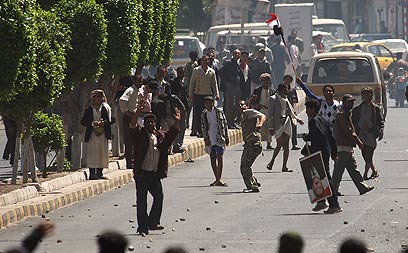


Libya launches harshest crackdown yet on rebels
Arab world continues to burn: Yemen's Saleh, a US alley in fight against terror, faces harsh criticism as 11 protesters die. Reports say Libya resembles bloody battlefield. Country's Arab League envoy resigns to join protests. Tunisian police shoot to disperse crowd
Security forces loyal to Libya's Muammar Gaddafi unleashed heavy gunfire Sunday on thousands marching in a rebellious eastern city, cutting down mourners trying to bury victims in a bloody cycle of violence that has killed more than 200 people in the fiercest crackdown on the uprisings in the Arab world.
Protests were even reported to have spread to downtown Tripoli and a coastal city only about 45 miles (about 70 kilometers) to the west of the capital. In Benghazi, site of the funeral clashes, pro- Gaddafi forces were chased from a presidential compound by other troops sympathetic to the anti-government demonstrators, a witness said.
Benghazi is "in a state of war," said Mohamed Abdul-Rahman, a 42-year old merchant, who described how some protesters burned a police headquarters.
A resident of the Libyan capital told Reuters on Sunday he could hear gunshots in the streets and crowds of people.
"We're inside the house and the lights are out. There are gunshots in the street," the resident said by telephone. "That's what I hear, gunshots and people. I can't go outside."
An expatriate worker living in the Libyan capital told Reuters: "Some anti-government demonstrators are gathering in the residential complexes. The police are dispersing them. I can also see burning cars."
Instability and anti-government protests inspired by uprisings in Egypt and Tunisia continue to spread in the Middle East. Libyans protesting against Gaddafi's rule appeared to control the streets of Benghazi on Sunday, even though the security forces have killed scores in the bloodiest of multiple revolts now rocking the Arab world.
Residents said tens, perhaps hundreds of thousands of protesters had taken to the streets of the city to bury scores of dead killed in the last 24 hours.
Meanwhile, Libya's representative to the Arab League has tendered his resignation in protest to "oppression against protesters", Al Jazeera's Mubasher (live) channel reported on Sunday.
It gave no other details in its initial report.
Libyan security forces opened fire on protesters in the country's second city Benghazi on Sunday, a witness said, after scores died in one of the bloodiest days of protests sweeping the Arab world. With government buildings ransacked and troops and police forced to retreat to a fortified compound, from where they picked off demonstrators with sniper and heavy-weapons fire.
"The security forces are in their barracks and the city is in a state of civil mutiny," one witness told Reuters.
In Libya, Gaddafi responded to the biggest challenge of his four decades in power with ruthless force. New York-based Human Rights Watch said 84 people were killed in the city on Saturday, bringing the death toll in four days of clashes mainly in the east of the country to 173.
Benghazi and the surrounding area have been the focus of the unrest. But posts on social network sites, which could not be verified, referred to minor clashes in the capital Tripoli and overnight gunfire in Nalut to the west.

Protesting against Gaddafi in Washington (Photo: AP)
The situation there was confused as the government has restricted media access and communications have been patchy. One witness said many police and soldiers had joined protesters.
Local government offices and police stations had been torched, the witnesses said. As on previous days, thousands of people gathered near the northern Benghazi courthouse on Sunday chanting: "We want to bring down the regime... Allah Akbar!"
A senior US diplomat on Sunday condemned the brutal crackdown on opposition protesters in Libya, saying Arab leaders facing pro-democracy protests need to lead the way rather than resist reform.
Susan Rice, the US ambassador to the United Nations, said the Obama administration was "very concerned" about reported armed attacks by Libyan security forces on peaceful protesters in the eastern city of Benghazi.
"We've condemned that violence," Rice told "Meet the Press" on NBC television. "Our view is that in Libya as throughout the region peaceful protests need to be respected."
The United States is urging its citizens to avoid non-essential travel to Libya because of the continuing clashes between protesters and security forces, which so far have led to at least 200 deaths.
In a travel warning issued Sunday, the State Department also cautions citizens already in Libya against traveling to eastern Libya, where many of the protests are taking place.
Gaddafi still respected by Libyans
But Libya watchers said an Egyptian-style nationwide revolt was unlikely as regional grievances were a factor in the unrest. Gaddafi has less support in the east but is respected by many Libyans despite the absence of Western-style democracy. And Libya's oil wealth allows him to spread largesse to smooth over social problems.
Gaddafi has long been reviled by Western governments, although commercial ties have helped to improve relations in recent years.
Libya has told the European Union it will stop cooperation with the bloc in stemming illegal migration to Europe if the EU encourages the protests, the Hungarian EU presidency said.
British Foreign Secretary William Hague urged Libya to begin dialogue with the protesters and implement reforms, in a phone call to Gaddafi's son Saif al-Islam Gaddafi.

Morocco. Demanding king step down (Photo: AFP)
Al-Jazeera jammed
Meanwhile, Al-Jazeera's signal across the Middle East and North Africa was plagued by jamming on Sunday, the Arab satellite broadcaster said, and Lebanon said the electronic interference was coming from Libya.
The station has exhaustively covered events in Libya, Bahrain and Yemen, contacting protesters and government backers by telephone and often airing footage of events sent via the Internet.
Earlier this month, Egypt's Nilesat cut off Al-Jazeera's signal for more than a week after authorities there ordered it to stop operations in Egypt during the unrest that ultimately ended President Hosni Mubarak's 30-year rule.
Yemen concerns US
The riots continued on Sunday across the Arab world. In Tunisia, several thousand protesters swarm the governmental palace to demand the ouster of the provisional government. Police briefly fired warning shots to disperse the crowd that defied government warnings not to challenge emergency measures enacted after the toppling of President Zine El Abidine Ben Ali's 23-year rule last month.
At least 2,000 protesters gathered in a square in Morocco's capital on Sunday to demand that King Mohammed give up some of his powers and clamp down on government corruption.
In Yemen, thousands of people also staged sit-ins in other cities, demanding the departure of President Ali Abdullah Saleh, who renewed his call for the opposition to pursue a dialogue.

Riots in Yemen. Worried about Al-Qaeda (Photo: AFP)
The offer by the US-backed Ali Abdullah Saleh, which opposition groups swiftly rejected, came as protests calling for his ouster continued in at least four cities around the country for the 11th straight day. Saleh - in power for three decades – already promised he will not run for another term, but that does not interest the demonstrators.
On Sunday evening, a 17-year-old demonstrator was killed in the port city of Aden when the army opened fire to disperse a march there, bringing the death toll to nine since the protests began.
In their Sunday meeting, the European Union is considering economic, political and other ways in which the bloc can help the region engulfed in uprisings. These include a broader package of economic assistance to the countries involved.
Much is at stake in Yemen - a deeply troubled nation strategically located at the mouth of the Red Sea and next door to the world's largest oil reserves
The US is most worried about an Al-Qaeda offshoot that has taken root in Yemen's mountains to plot attacks beyond the country's borders. Saleh is quietly cooperating with the US in efforts to battle the Al-Qaeda franchise.
Associated Press and Reuters contibuted to this report
- Follow Ynetnews on Facebook















